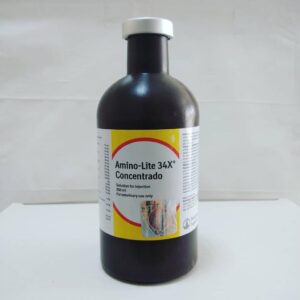Dexvet SB
Laminitis in Horses:
Horses are particularly susceptible to laminitis (a painful inflammation of the hoof) as a side effect of corticosteroid use.
Adrenal Insufficiency:
Prolonged use of corticosteroids can suppress the adrenal glands, leading to adrenal insufficiency when the drug is stopped abruptly.
Muscle Wasting and Weakness:
Chronic use can lead to muscle atrophy and weakness, especially in older animals or those on high doses.
Electrolyte Imbalance:
Dexamethasone can cause sodium retention and potassium loss, which may lead to imbalances in electrolyte levels.
Precautions and Warnings:
Tapering:
When discontinuing Dexvet SB after long-term use, tapering the dose is essential to prevent adrenal insufficiency.
Infections:
Due to its immune-suppressing effects, Dexvet SB should not be used in animals with untreated bacterial, viral, or fungal infections unless they are also receiving appropriate antimicrobial therapy.
Pregnancy:
Corticosteroids like dexamethasone should be used cautiously in pregnant animals, as they may cause complications like abortion or premature birth in some species.
Preexisting Conditions:
Use with caution in animals with diabetes, heart disease, kidney disease, or gastrointestinal ulcers, as corticosteroids can exacerbate these conditions.
Liver disease: Monitor liver function in animals with pre-existing liver conditions, as dexamethasone can affect liver function.
Combination with NSAIDs:
Combining corticosteroids with non-steroidal anti-inflammatory drugs (NSAIDs) can increase the risk of gastrointestinal ulcers and bleeding.
Laminitis Risk in Horses:
Regular monitoring is required when using corticosteroids in horses due to the risk of laminitis, especially in overweight horses.
Contraindications:
Untreated Infections: Should not be administered in animals with active, untreated infections.
Diabetes: Use cautiously in diabetic animals as it can increase blood glucose levels.
Pregnancy: Avoid or use with extreme caution in pregnant animals unless absolutely necessary.
Storage:
Store at room temperature in a dry place away from direct sunlight. Avoid freezing.
Drug Interactions:
NSAIDs: Increases the risk of gastrointestinal complications when combined with non-steroidal anti-inflammatory drugs.
Insulin or Antidiabetic Medications: Dexamethasone can reduce the efficacy of insulin and other antidiabetic drugs by raising blood sugar levels.
Diuretics: Can exacerbate potassium loss when used with diuretics.
Conclusion:
Dexvet SB is an effective anti-inflammatory and immunosuppressive corticosteroid used in veterinary medicine to treat a variety of conditions in animals. It provides significant relief from inflammation, allergic reactions, and autoimmune disorders but should be used carefully to avoid potential side effects, especially with long-term use. Regular monitoring and following veterinary instructions on dosage and duration are crucial to ensure the safety and efficacy of the treatment.
As always, consult with a veterinarian before starting any corticosteroid treatment, and follow all prescribed guidelines for administration and dosage.
Dexvet SB
Dexvet SB is a veterinary corticosteroid formulation containing dexamethasone or a similar synthetic glucocorticoid, used to treat inflammation, allergic reactions, and immune-mediated conditions in animals. Here’s a detailed overview of what you need to know about Dexvet SB, its uses, dosage, side effects, and precautions:
Active Ingredient:
Dexamethasone Sodium Phosphate or similar glucocorticoid, depending on the exact formulation.
This is a potent corticosteroid that helps reduce inflammation, suppress the immune system, and relieve pain.
Indications/Uses:
Dexvet SB is commonly used to treat various conditions in animals, including:
Inflammatory Diseases:
Helps manage inflammation in cases like arthritis, tendonitis, and bursitis in horses, cattle, dogs, and other species.
Allergic Reactions:
Treats acute allergic reactions such as anaphylaxis, insect bites, food allergies, and contact dermatitis.
Respiratory Conditions:
Effective in treating respiratory issues like chronic obstructive pulmonary disease (COPD) or heaves in horses by reducing airway inflammation.
Immune-Mediated Disorders:
Used in managing autoimmune diseases like immune-mediated hemolytic anemia (IMHA), thrombocytopenia, and other conditions where the immune system attacks the body’s own tissues.
Endocrine Disorders:
Helpful in managing adrenal insufficiency and other endocrine disorders where corticosteroids are lacking.
Trauma and Shock:
Used as part of the treatment protocol in animals experiencing shock or trauma, often after surgery or injury.
Cancer-Related Inflammation:
Used in palliative care to reduce inflammation and pain in animals with certain cancers.
Dosage and Administration:
Dexvet SB is available as an injectable solution, and the route of administration can be intravenous (IV), intramuscular (IM), or subcutaneous (SC) depending on the severity of the condition.
Dosage:
Dosages vary depending on the species, condition, and severity. Below are general guidelines:
Horses and Cattle: Doses typically range from 5 mg to 20 mg of dexamethasone, depending on the condition.
Dogs and Cats: Doses are generally calculated by weight, often 0.1 mg/kg to 0.5 mg/kg of body weight.
Frequency:
Typically administered once but may require repeated doses depending on the condition.
For long-term treatment, the veterinarian may recommend tapering off to avoid adrenal suppression.
Side Effects:
Common side effects of corticosteroids like Dexvet SB can include:
Increased Thirst and Urination:
Polydipsia (excessive thirst) and polyuria (excessive urination) are common with corticosteroid use.
Increased Appetite and Weight Gain:
May lead to overeating and subsequent weight gain.
Immune Suppression:
Long-term or high-dose use can suppress the immune system, increasing the risk of infections.
Gastrointestinal Upset:
Corticosteroids can cause stomach ulcers, gastrointestinal bleeding, or vomiting, especially when used for extended periods.




Reviews
There are no reviews yet.